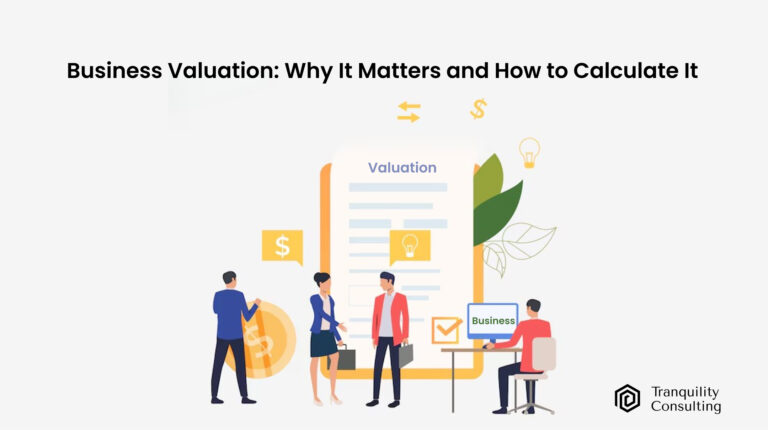Understanding a business’s value is vital for various reasons, from facilitating mergers and acquisitions to attracting investors or planning for future growth. A proper business valuation gives insights into your company’s financial health and helps in strategic decision-making. It answers the all-important question: How much is your business worth? This blog will dive into why business valuation matters and the various methods used to calculate business value.
Why Business Valuation Matters
- Mergers and Acquisitions
A business valuation is essential to merge with another company or sell your business. It helps the buyer and the seller reach a fair agreement on the company’s worth. A well-calculated business valuation prevents under-pricing or overpricing, ensuring both parties are satisfied.
- Investment and Funding Opportunities
Investors and lenders often examine your company’s valuation to determine its growth potential. A well-calculated business valuation gives them a clear picture of what they’re investing in, helping you secure the necessary funding.
- Exit Strategy and Retirement Planning
Knowing your company’s value is crucial if you plan to exit the business or are close to retirement. It allows you to sell the business somewhat, ensuring a smooth transition for the next generation of leadership or ownership.
- Tax Planning
Business valuation can assist in tax-related matters, particularly if you pass the business on to family members or go through estate planning. A precise valuation makes it easier to handle gift taxes, estate taxes, and capital gains taxes.
- Strategic Decision Making
Knowing your business’s worth enables you to make more informed decisions regarding growth strategies, diversification, or even when to pivot. Whether you want to expand operations or enter a new market, the business valuation is a guiding metric.
How to Calculate Business Valuation
There are several methods to calculate business value, each offering different insights depending on the type of business, its stage, and industry. Here are some common approaches:
- Market Capitalization
Market capitalization is one of the simplest methods of business valuation. It is calculated by multiplying the company’s stock price by its outstanding shares. This method is typically used for publicly traded companies and offers a glance at what the market believes the company is worth. However, it might need to account for other important factors such as intellectual property, market conditions, or future growth potential.
Formula: Market Capitalization = Share Price x Outstanding Shares
- Asset-Based Valuation
This method calculates a company’s net value by subtracting liabilities from assets. This method has two variations: the book value approach and the liquidation value approach. Asset-based valuation is often used for asset-heavy businesses such as manufacturing companies. Still, it doesn’t necessarily account for the value of intangible assets like brand reputation or customer loyalty.
- Book Value: Focuses on the historical cost of assets minus depreciation.
- Liquidation Value: Considers the current market value of assets if they were sold off immediately.
Formula: Business Value = Total Assets – Total Liabilities
- Earnings Multiplier
The earnings multiplier method examines a company’s ability to generate future profits by applying a multiplier to its current earnings. The multiplier can vary based on industry norms, future growth potential, and current economic conditions.
Formula: Business Value = Earnings x Multiplier
- Discounted Cash Flow (DCF)
The Discounted Cash Flow (DCF) method calculates the present value of future cash flows. It discounts future earnings to determine their worth in today’s dollars, considering the time value of money. The DCF method is beneficial for businesses with steady cash flow.
Formula: Business Value = (Future Cash Flow) / (1 + Discount Rate)^Number of Years
- Comparable Company Analysis (CCA)
The comparable company analysis (CCA) method compares businesses to similar companies within the same industry. Analysts will look at crucial valuation metrics, such as EBITDA (earnings before interest, taxes, depreciation, and amortization), to compare businesses of similar size and financial health. This method helps you understand your company’s value about its competitors, which can be especially helpful during mergers or acquisitions.
Factors That Affect Business Valuation
Several factors influence business valuation, including but not limited to:
- Industry Trends: The state of the industry can significantly impact the business valuation. A booming sector can result in higher valuations, while a declining one can reduce a company’s value.
- Market Conditions: The current state of the market, including interest rates and investor sentiment, can affect the demand for your business and its perceived value.
- Company Financials: Revenue, profit margins, and cash flow are crucial metrics that directly impact your business valuation. Consistent growth in these areas often leads to higher valuation figures.
- Intangible Assets: Intellectual property, brand reputation, customer loyalty, and patents can significantly increase your company’s valuation, particularly in industries like tech or pharmaceuticals.
Choosing the Right Valuation Method
The method you choose to calculate business value depends mainly on the context. For example:
- The market capitalization or earnings multiplier methods may be most relevant if you sell the business or merge with another.
- The asset-based valuation method best fits family businesses where asset transfer is shared.
- If you’re planning for future growth or attracting investors, this offers a detailed look at long-term value.
Conclusion
A proper business valuation is essential whether you’re selling your company, seeking investment, or planning for the future. From understanding your company’s strengths and weaknesses to making informed strategic decisions, calculating the value of your business should never be overlooked. While several methods are available—from market capitalization to discounted cash flow—the best approach depends on your business’s unique situation and objectives. Understanding how to calculate business value is critical in ensuring long-term success and growth for any business owner.
FAQs
1. Why is business valuation important for small businesses?
- Business valuation is crucial for small businesses as it helps them obtain investments, plan for expansion, and prepare for exit strategies. Knowing the business valuation also aids in tax planning and financial decision-making.
2. What is the best way to calculate a tech startup’s business value?
- The Discounted Cash Flow (DCF) method is often ideal for tech startups as it focuses on future cash flows. Startups with high growth potential benefit from this forward-looking valuation method.
3. How often should a business perform a valuation?
- It’s advisable to perform a business valuation annually or whenever a major business decision is imminent, such as raising funds, merging, or planning an exit.
4. Can intangible assets affect the valuation of a business?
- Yes, intangible assets like intellectual property, brand reputation, and patents significantly impact business valuation, particularly in industries where innovation is key.
5. How can Tranquility Consulting help with business valuation?
- Tranquility Consulting offers expert guidance on choosing the right business valuation method, ensuring you make informed financial decisions that align with your business goals.
If you have any questions or need business-related tax consulting advice, please contact us at: [email protected]





